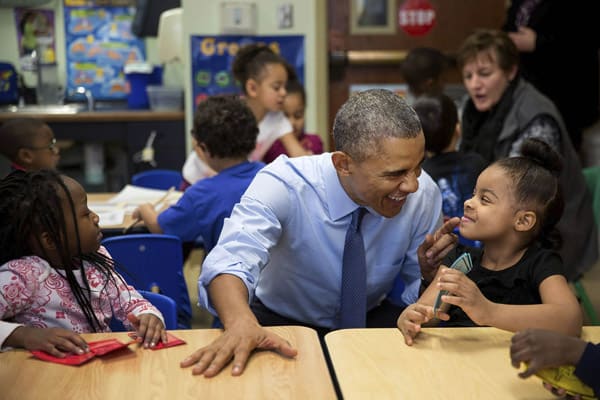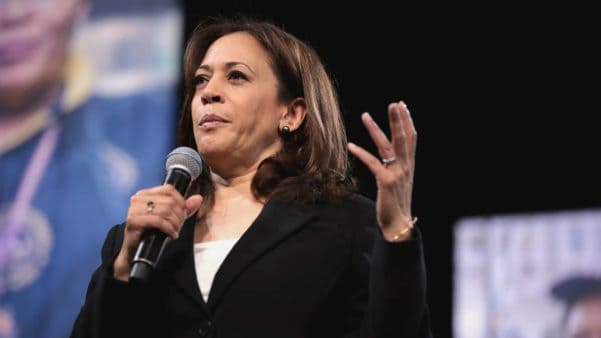After the Obama Disappointment, Black Voters Want More Than Empty Symbolism
Malaika Jabali, The Guardian, December 5, 2019

President Barack Obama visits the Community Children’s Center, one of the nation’s oldest Head Start programs. (Credit Image: © Pete Souza/The White House/ZUMAPRESS.com)
The lines in my DeKalb county, Georgia, polling site wrapped around the corner. Each of the hopeful voters in our predominantly black election district waited about two hours, alternately sitting, standing and passing the time with southern pleasantries, moments away from voting for America’s first black president. And it wasn’t yet the official voting day.
I had gone home from my graduate studies in New York City to vote early. I knew Barack Obama wasn’t perfect, but he offered a bold vision following the financial crisis – and that’s what we needed. I was back in Harlem when election day results trickled in. We witnessed the unimaginable. Barack Obama became president, turning my deep southern state of Georgia purple and somehow convincing white blue-collar workers in a handful of swing states to choose him over a Republican.
At a campus watch party – among the generation that would later be identified as hapless, capitalism-killing millennials – we felt unadulterated joy. Media outlets circled around what they considered the epicenter of black life on 125th Street in Harlem, capturing the thousands of people who descended on to the streets to dance. We blocked traffic and exchanged high-fives with strangers, ignoring the mist that was swelling our straightened hair. The hope Obama promised was omnipresent and lasted for days. Then 2009 happened.
We graduated into the worst job market in a generation, threatening our ability to pay back our college and post-graduate debts. Obama filled his cabinet with financial industry operatives. We saw a bailout for banks and big business that dwarfed the stimulus of American households. Despite middle-class trappings, economic insecurity hit me and much of our generation hard. Back home, my mother and I struggled to pay for a home that mortgage lenders targeted with a subprime mortgage. We saw Trayvon Martin, Sandra Bland, Michael Brown and Rekia Boyd shot and killed. We saw the beer summit and respectability politics. Despite doing many things “right”, it wasn’t enough. Homes in our mostly black neighborhood outside of Atlanta still have not recovered. Justice for most of the families of police and vigilante violence has still been unserved. Banks are still being bailed out.
In hushed circles – dinner parties and barber shops, group chats and family gatherings – the relatively universal enthusiasm for Obama tapered as his presidency came to a close. Hope for many of us has been replaced with resignation. For those who still believe in participating in electoral politics, there is inherent compromise with our decisions as a national minority. The radical and progressive among us know we can’t get everything we want through federal politics. But we want someone who acknowledges the need for structural change and will at least try to fight for it.

Kamala Harris
So when the California senator Kamala Harris announced her bid for the presidency, women at the intersections of a marginalized race and class had to consider what this meant for us. We saw the recording of her mocking organizers who want more schools and fewer prisons. We saw her silence on progressive policing legislation as a prosecutor while embracing her role as a “top cop”. We saw that she branded herself as tough on crime in the midst of Black Lives Matter. We saw the big money fundraisers and waffling on Medicare for All. We saw social policies but no desire to “restructure society”, despite grotesque wealth inequality and America’s racial caste system. In a time when people want moral clarity and black Americans are struggling for a firm economic footing, these mixed messages would never win.
Her subsequent suspension of her 2020 presidential bid on Tuesday makes us consider those same intersections. Thus, assessments of her campaign failures cannot be reduced to her identity alone. Like Obama’s wink and nod to the financial sector, despite his populist campaign rhetoric, Harris’s wink and nod to those existing power structures throughout her career have been telling. For many younger black voters, this meant lending their support to other candidates who have campaigned on progressive policies or withholding support for a particular candidate altogether. In a September Essence poll, most black women aged 18-34 were unsure of their vote, followed by nearly 19% of them supporting the Vermont senator Bernie Sanders. Harris followed at 17%. Among black voters in South Carolina, support among the candidates without the former vice-president Joe Biden in the race has Sanders in the lead, followed by Warren and then Harris, according to a Monmouth poll.
Harris’s inability to capture significant black support does not preclude that if she were white and a man, she would have probably gone farther. Biden was the liberal face of the Democrats’ tough on crime posturing since the Reagan era. Michael Bloomberg entered the race with a racist stop-and-frisk policy and broken windows policing on his administration’s résumé. The Minnesota senator Amy Klobuchar was a tough-on-crime prosecutor. The South Bend mayor, Pete Buttigieg, undermined black criminal justice demands as mayor of a small town where racial inequality exceeds national rates. But their roles in regressive criminal justice policy have not significantly impacted their campaigns.
This does not mean Harris deserves a revisionist history as a progressive champion because she’s enduring a systemically racist system. It does not mean she gets a pass for frequently conservative positions among the Democratic field. Rather, none of them should.
As a woman who is also black and professional, there was an expectation to support Kamala. I don’t confuse her sorority call with random “screeching”, having had Alpha Kappa Alpha sorority members and HBCU alums ever-present in my life. I have witnessed close black female friends make it into the big law halls of Paul Weiss, the host for the high-dollar fundraiser that she cancelled upon retiring her presidential campaign. This familiarity may be enough for some black people. Her incremental reforms for black households could have been useful. Her messaging about black issues – such as segregation and voter suppression – was well-timed in debates that focus very little on them. But in 2019, after a decade of fleeting hope and longer-lasting economic anxiety, this is not enough. Some of us believe restructuring society is possible, and we still want to try and fight for it.















